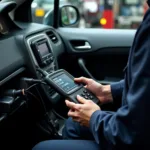Looking for the cheapest diagnostic car tool? You’re not alone. With so many options on the market, finding one that fits your budget and meets your needs can feel overwhelming. But don’t worry – we’re here to help you navigate the world of car diagnostics without breaking the bank.
Understanding Your Needs: The First Step to Savings
Before diving into the cheapest options, it’s crucial to understand what you need from a diagnostic car tool. Are you a DIY enthusiast looking to troubleshoot basic engine codes? Or a professional mechanic needing advanced functionalities like bi-directional controls and ECU programming?
Clearly defining your requirements will help you avoid overspending on features you don’t need. Remember, the cheapest tool isn’t always the best value – it’s about finding the right balance between price and functionality.
Exploring the Spectrum: From Basic Scanners to Professional Devices
The market for car diagnostic tools is vast, offering a range of options from budget-friendly scanners to high-end professional devices. Let’s break down the categories:
1. Basic OBD2 Scanners: These are your entry-level tools, ideal for DIYers and car owners looking to read and clear basic engine codes. They are readily available online and at auto parts stores, often priced under $50.
2. Code Readers with Enhanced Features: For a bit more functionality, you can opt for code readers that offer live data streaming, freeze frame data, and even emissions readiness checks. These tools typically range from $50 to $150.
3. Semi-Professional Scanners: These tools bridge the gap between basic and professional devices. They offer advanced features like ABS and airbag system diagnostics, some bi-directional controls, and even manufacturer-specific code definitions. Prices for these scanners vary depending on the features, typically starting around $200.
4. Professional-Grade Scan Tools: These are the heavy hitters, packed with advanced functionalities like ECU programming, key coding, module coding, and comprehensive system diagnostics. They are a significant investment for professional mechanics and workshops, often costing thousands of dollars.
The “Cheapest” Doesn’t Always Mean Affordable
While it’s tempting to gravitate towards the absolute cheapest option, remember that quality and reliability are paramount. A tool that malfunctions or provides inaccurate readings can lead to misdiagnosis and costly repairs down the line.
“Investing in a reliable diagnostic tool, even if it’s slightly more expensive, can save you money and headaches in the long run,” says John Smith, Senior Automotive Technician at XYZ Auto Repair.
Instead of focusing solely on the initial price tag, consider the tool’s:
- Build Quality: Look for well-constructed tools with durable materials and a solid feel.
- Software Updates: Regular software updates are crucial for ensuring compatibility with newer car models and access to the latest features.
- User Interface: A user-friendly interface will make navigating the tool’s menus and interpreting data easier.
- Customer Support: Reliable customer support can be invaluable when you encounter issues or have questions about the tool.
Factors Affecting the Price
Several factors influence the cost of car diagnostic tools, including:
- Functionality: The more features a tool offers, the higher the price tag.
- Brand Reputation: Established brands often command a premium price for their products due to their reputation for quality and reliability.
- Software Compatibility: Tools that offer manufacturer-specific diagnostics and functionalities tend to be more expensive.
- Wireless Connectivity: Bluetooth and Wi-Fi connectivity add to the convenience and versatility of a tool, but also increase its price.
Finding the Best Value: Tips for Smart Shopping
- Determine Your Must-Have Features: Create a list of essential functionalities based on your needs.
- Set a Realistic Budget: Decide how much you’re willing to spend and stick to it.
- Read Reviews: Check online reviews from other users to get insights into the tool’s performance, reliability, and user-friendliness.
- Compare Prices: Shop around and compare prices from different retailers to ensure you’re getting the best deal.
- Consider Refurbished Options: Refurbished tools can be a cost-effective way to get your hands on a higher-end model at a lower price. However, make sure to purchase from a reputable seller offering a warranty.
Conclusion: Empowering Yourself with the Right Diagnostic Tool
Finding the cheapest diagnostic car tool requires careful consideration of your needs, budget, and the features that matter most. While budget-friendly options exist, it’s crucial to prioritize reliability and functionality to avoid costly misdiagnoses. By following our tips and doing your research, you can find the perfect diagnostic tool to empower you with the knowledge and confidence to tackle car repairs head-on.
Need expert advice on choosing the right car diagnostic tool? Contact us via WhatsApp: +1(641)206-8880 or email us at [email protected]. Our team of experts is available 24/7 to assist you.
